by Dr. M | Jul 25, 2018 | Cataracts, Diabetes, Dilation, Exam, Experience, Eyeglasses, Glasses, LASIK, Macula, Mark Moran, Medical Eye Care, Patient Care, Retina
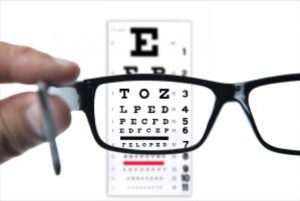
Are you Seeing your Best?
How Vision is Measured
The distance vision of a normal human eye is defined at 20/20. This number illustrates what a person with normal vision can see at twenty feet. Your visual acuity is measured on how it relates to vision at 20 feet.
- If your vision is 20/40, you can see at 20 feet, what a normal eye can see at 40 feet.
- If your vision is 20/100, you can see at 20 feet, what a normal eye can see at 100 feet.
- If your vision is 20/400, you can see at 20 feet, what a normal eye can see at 400 feet.
When you read an eye chart, chances are that person testing you is paying attention to what you say, as well as how you say it. They will know if you are seeing clearly or are struggling and making guesses. It never pays to cheat on your eye test!

Driving requirements
How well do I need to see to drive?
Although each state determines their specific requirements, generally 20/40 vision is needed to pass the driving test. If you need glasses to see 20/40, it will be indicated on your driver’s license. While your distance vision is key to passing the driving test, there are other factors that are considered as well. For complete information on what is required in Pennsylvania, click on the link.
Pennsylvania Drivers Visual Standards
After vision correction surgery, like LASIK or cataract surgery, you may be able to see well enough to have the vision correction restriction removed from your license.
What is legally blind?
If you cannot see any letters below the 20/200 line, even when wearing glasses or contacts, you are considered legally blind. If your vision can be corrected by putting on a pair of glasses, you may have poor vision, but you are not legally blind.
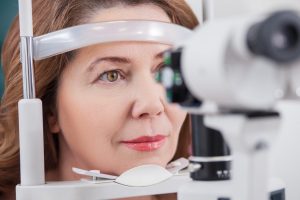
I see 20/20, do I need an eye exam?
Absolutely! Measuring your vision is an important part of your comprehensive exam, but there is so much more that we check at your visit. We will check your pupils, eye pressure and field of vision. We will record your visual history, health history and medications. The doctor will examine the health of your eyes using a slit lamp microscope, checking for eye disease, including glaucoma, macular degeneration, diabetic retinopathy and cataracts.
Early detection of eye disease is your best defense against vision loss. So even if you don’t need a new pair of glasses, make sure to schedule your regular check-up, so you can keep seeing your best!
by Dr. M | Jul 2, 2018 | Experience, Eye Protection, Eye Safety, Eyeglasses, Fun Stuff, Glasses, Office, Patient Care, Sun Damage, Sunglasses, UV Rays, Vision

Have some safe summer fun in the sun!
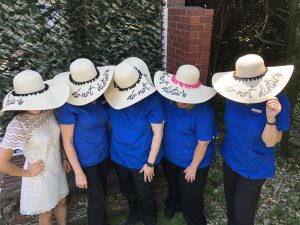 Dr. Moran makes sure that every member of his team is well-taken care of! To help insure a safe & happy 4th of July holiday, he gave us a special Independence Day gift…wide-brimmed hats to keep the sun off of our faces and out of our eyes!
Dr. Moran makes sure that every member of his team is well-taken care of! To help insure a safe & happy 4th of July holiday, he gave us a special Independence Day gift…wide-brimmed hats to keep the sun off of our faces and out of our eyes!
When we hit the beach and the pool, we’ll be sure to complete the look by adding sunscreen and sunglasses with UV Protection to keep our skin and eyes safe from the damaging rays of the sun!

Dr. M always takes the time to show that he cares for his patients and his staff too! So we weren’t surprised that he took an extra step to make sure that we will return from the holiday well-rested. The hats have a special “Do Not Disturb” message on the brim!
Please note! Our office will be closed Wednesday, July 4th and Thursday, 5th of July. We will re-open on Monday, July 9th.
Enjoy the holiday! From Dr. Moran and the rest of the team at Moran Eye Associates, from right to left:
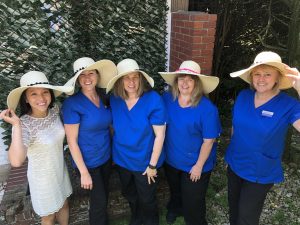
Fun in the sun!
Dr. Bianca Tang, Cindy Male, Mandy Bolton, Beth Handwerk & Bobbi Spain
by Dr. M | May 8, 2018 | Cataracts, Dilation, Education, Exam, Eyeglasses, Medical Eye Care, Patient Care, Procedure, Surgery
The Cataract-M&M Connection!
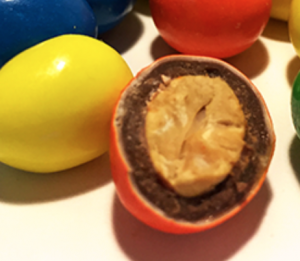
Peanut M&Ms are like your eyes with cataracts!
If you know Dr. Moran, you know that he is an expert at making analogies to better explain vision and visual issues to our patients. One of our favorite examples is how he explains what happens during cataract surgery.
Yes, that’s where the Peanut M&M comes in!
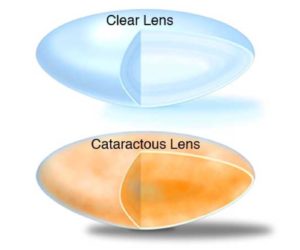
Dr. Moran explains that a mature cataract is like a peanut M&M. It has 3 major parts: capsule, cortex and nucleus.
- The capsule = candy coating.
- The cortex = chocolate.
- The nucleus = the peanut inside!
During cataract surgery, Dr. Moran will remove the nucleus and cortex (peanut & chocolate), while leaving the capsule (the candy shell) in place. After the cortex and the cataract are removed, he will insert a new lens in its place. This new intraocular lens (IOL) has a prescription in it, just like the lenses in your eyeglasses have a prescription in them.

After Cataract Surgery you may not need glasses!
Many patients tell us that they have the best vision of their lives following cataract surgery! They see more clearly and colors seem more vibrant. Depending on the type of lens implant that they choose, they may not need to wear glasses at all!
If you, or someone you know, has noticed a change in their vision, come in for a cataract evaluation with Dr. Moran. He will dilate your eyes to see if cataracts are developing, and he will let you know if you are ready to have your cataracts removed.
by Dr. M | Nov 7, 2017 | Donate, Eyeglasses, Glasses, Medical Eye Care, Office
 You can change lives by donating your used eyeglasses – RECYCLE for SIGHT!
You can change lives by donating your used eyeglasses – RECYCLE for SIGHT!
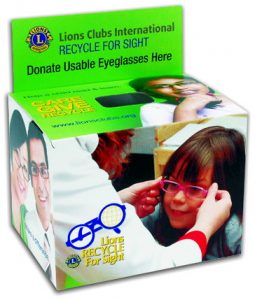
We have a donation box in our office!
Moran Eye Associates is working with the local Lions Club to collect eyeglasses to distribute to those in need. Dr. Mark Moran and his wife, Paulette are Lions Club members. They encourage everyone to donate their used specs.
Changing lives, one pair at a time: In almost any home, you can find a pair of eyeglasses that are no longer being used. Need a little motivation to clean out those drawers? Your donated eyeglasses can change the lives of children and adults.
For many years, the Lions Club “Recycle Your Sight” program has distributed glasses to people in need in low and middle-income communities. Donated glasses can:
Success in school: Help a child read
Work opportunities: Help an adult succeed in his or her job
Quality of life: Help a senior maintain independence

Thanks for your donation, Sherri!
We know that many of our patients no longer need their old prescription glasses. Especially those who have improved their vision through LASIK or cataract surgery with Dr. Moran!
If you have a pair (or more!) of glasses to donate, bring them to our office at 1204 Delaware Avenue in Fountain Hill. We would be happy to accept your donation during our normal office hours, 8-4pm, Monday -Thursday. Prescription glasses, reading glasses, and sunglasses are all needed.
Looking for a great community service project for your office or for student groups? This recycling program is an easy project to coordinate. Contact us for more information and to request a collection box.
Lions Club – Recycle for Sight



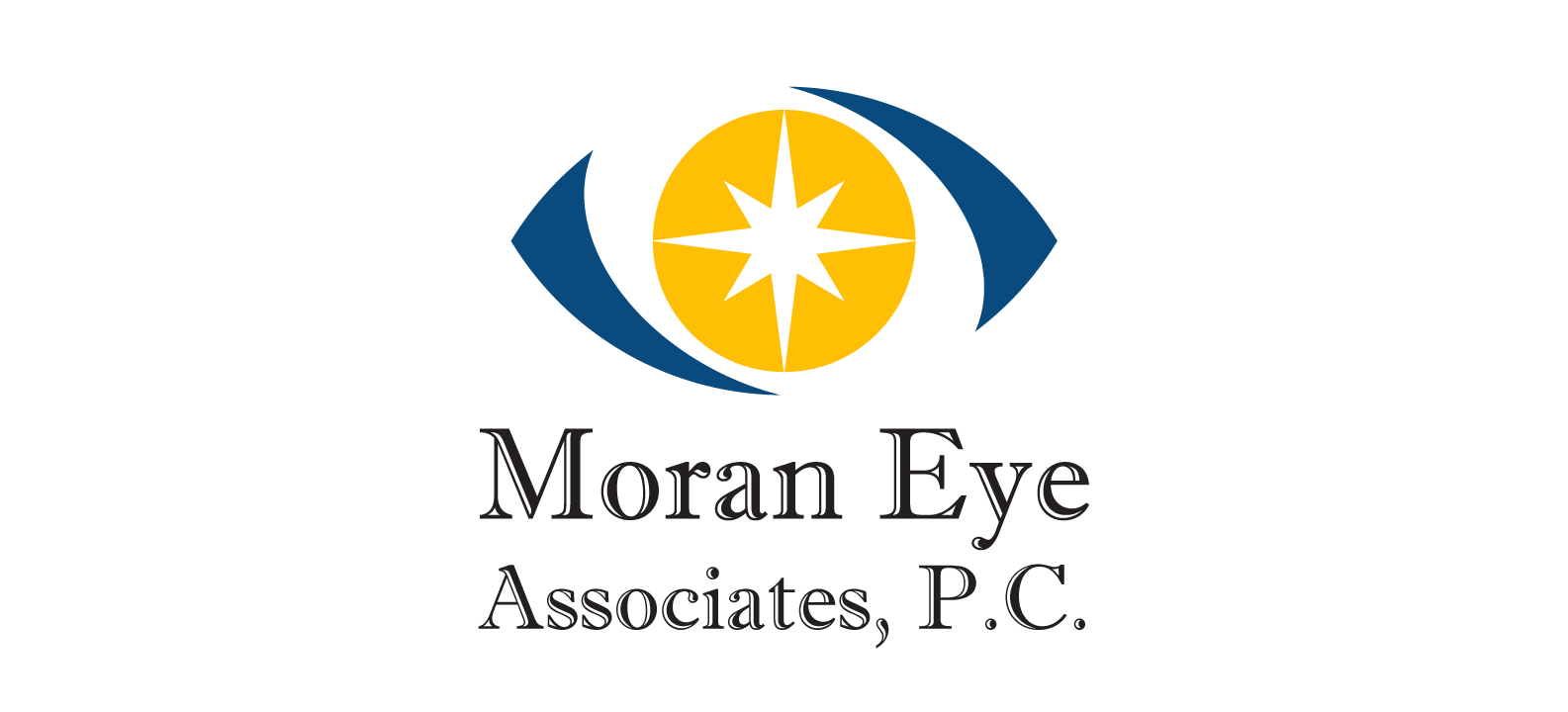

 Dr. Moran makes sure that every member of his team is well-taken care of! To help insure a safe & happy 4th of July holiday, he gave us a special Independence Day gift…wide-brimmed hats to keep the sun off of our faces and out of our eyes!
Dr. Moran makes sure that every member of his team is well-taken care of! To help insure a safe & happy 4th of July holiday, he gave us a special Independence Day gift…wide-brimmed hats to keep the sun off of our faces and out of our eyes!




 You can change lives by donating your used eyeglasses – RECYCLE for SIGHT!
You can change lives by donating your used eyeglasses – RECYCLE for SIGHT!
